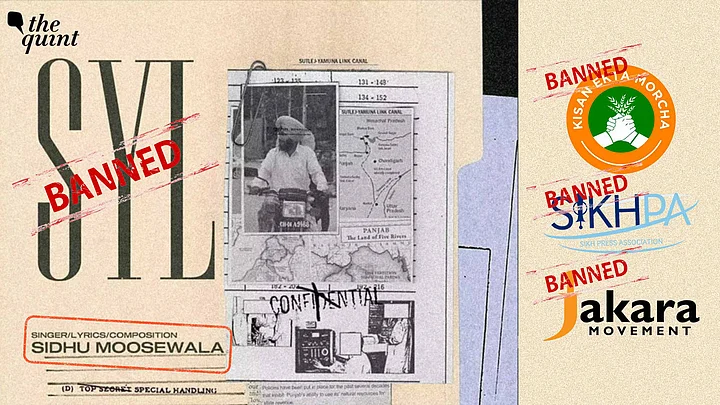Several Sikh and Punjab-based Twitter handles have been banned in India in the past few weeks. This comes around the same time as the ban on Sidhu Moose Wala's posthumous song 'SYL' in India on YouTube.
The Twitter handles that have been banned include @KisanEktaMorcha and @Tractor2Twitr that were extremely active during the farmers' protest and played a key role in mobilising online support for the movement against the Narendra Modi government's farm laws.
The banned accounts include the Twitter handles of the United Kingdom-based Sikh Press Association (@SikhPA) and the United States-based Jakara Movement (@JakaraMovement). Another UK-based handle – @SherePanjabUK – has also been banned.
The Twitter handles of a few individual Sikhs who speak out on political issues, have also been banned in India, such as that of Amaan Bali and Angad Singh Khalsa.
Why Is This Happening?
If one goes to the profiles of the banned handles, it shows that the accounts have been "withheld in India in response to a legal demand." Such legal demands are usually made from a government agency.
It is not clear whether this has been done under the directions of the central government, the Punjab government, or any other government agency.
The people managing the Kisan Ekta Morcha handle received a message saying that their account is being withheld under India's IT Act, 2000.
The reasons for such bans are unclear, especially as the banned handles represent very different political strands within the Sikh community.
If Kisan Ekta Morcha and Tractor to Twitter were handles being run by supporters of farm unions, the Jakara Movement is a community organisation and Sikh Press Association is aimed at media advocacy on Sikh issues.
Though both Kashmiri Sikhs, Angad Singh Khalsa and Amaan Bali have very different views on several issues.
Therefore it can't even be seen as a ban on one particular ideology within Sikhs.
Angad Singh Khalsa, who is a human rights activist associated with Dal Khalsa, said, "I don't know which tweet of mine goes against the law...this is a direct violation of my freedom of speech."
"We are not sheep or goats or any artificial intelligence set up who will work as per inputs given to us. We are humans and we will say and share what we feel."Angad Singh Khalsa, human rights activist
According to Amaan Bali – who identifies as a Sikh activist and history enthusiast – this is being done to prevent any international attention on what is happening in India.
"In my understanding banning of accounts like mine or that of @SikhPa or @Tractur2twitr is no coincidence. The government has always had issues with Sikhs across the globe getting united by dissolving their differences, these handles including mine aimed at that," he said.
It is significant to note that most of these bans – not just this year but also in 2020 and 2021 – happen in June, when Sikhs observe the anniversary of Operation Bluestar.
While from the perspective of the army and Indian State, this was an operation to “flush out militants led by Jarnail Singh Bhindranwale from the Darbar Sahib complex in Amritsar," for many Sikhs, it is a deeply traumatic event.
They see it as part of the Teeja Ghallughara (Third Holocaust) that involved the destruction of their highest temporal seat – the Akal Takht – and continued up till the anti-Sikh pogrom a few months later in 1984.
Not the First Time This Is Happening
In June 2021, the Twitter account of Punjabi singer Jazzy B was blocked in India. In response to the ban, Jazzy B told The Quint that he was being silenced for "speaking out in favour of farmers and against the government." "Anyone who raises their voice is being silenced. Is this a democracy?" he questioned.
Jazzy B said that he would be legally challenging the ban, but his account still remains withheld in India.
In June 2020, Punjab-based news and current affairs website Sikh Siyasat was banned for some time. On YouTube, the accounts of Akaal Channel, TV84, and KTV also faced bans in 2020. All these were Punjabi channels focussing on Sikh community issues.
Around the same time, the hashtag #Sikh was found to be blocked on Facebook and Instagram, though later, they claimed that this happened accidentally.
Parmjeet Singh, the editor of Sikh Siyasat, reacted to the latest bans, terming them as an "abuse of power" by the government.
"This is abuse of power. The government won't stop here. The so-termed mainstream media may be thinking that this will not happen to them but the way government is moving ahead on the path of abuse of power, they will soon start feeling the burn," he said.
